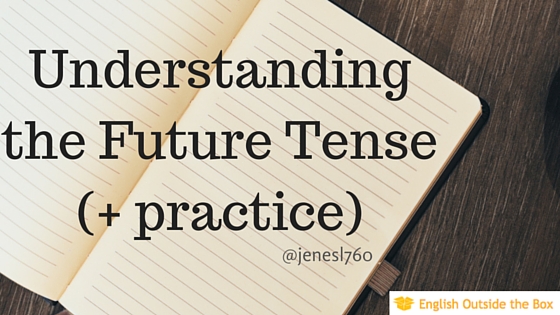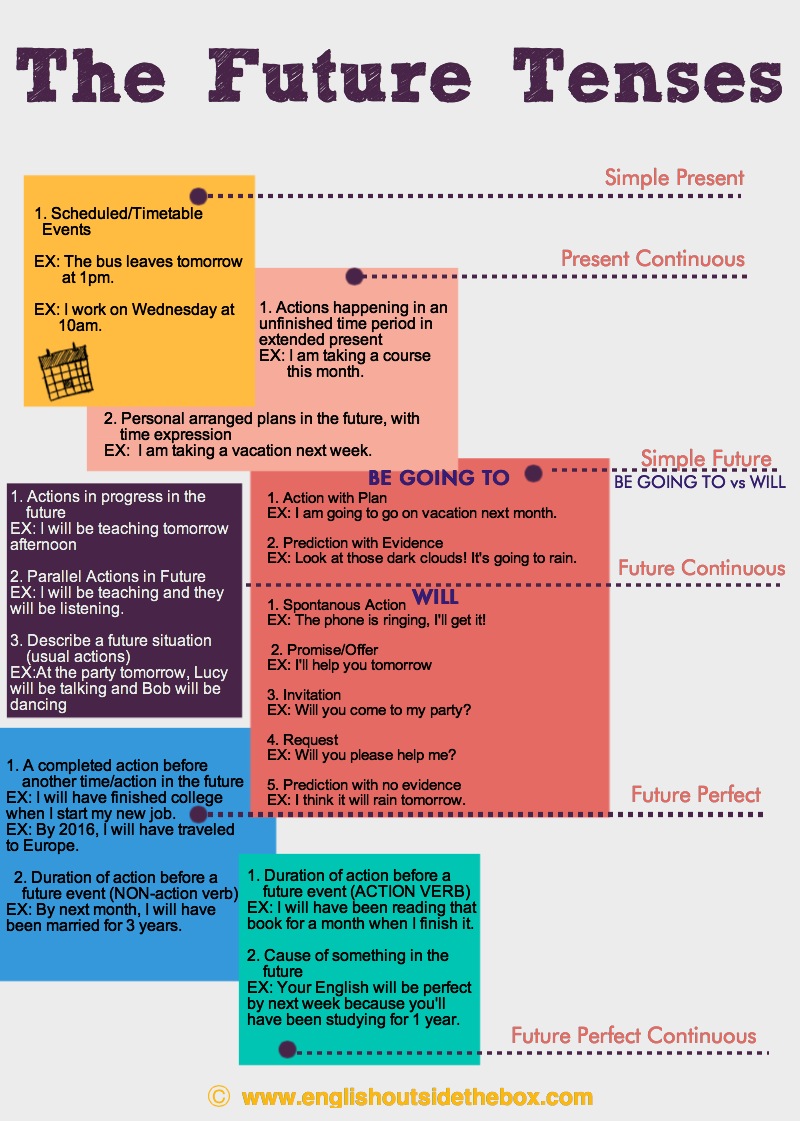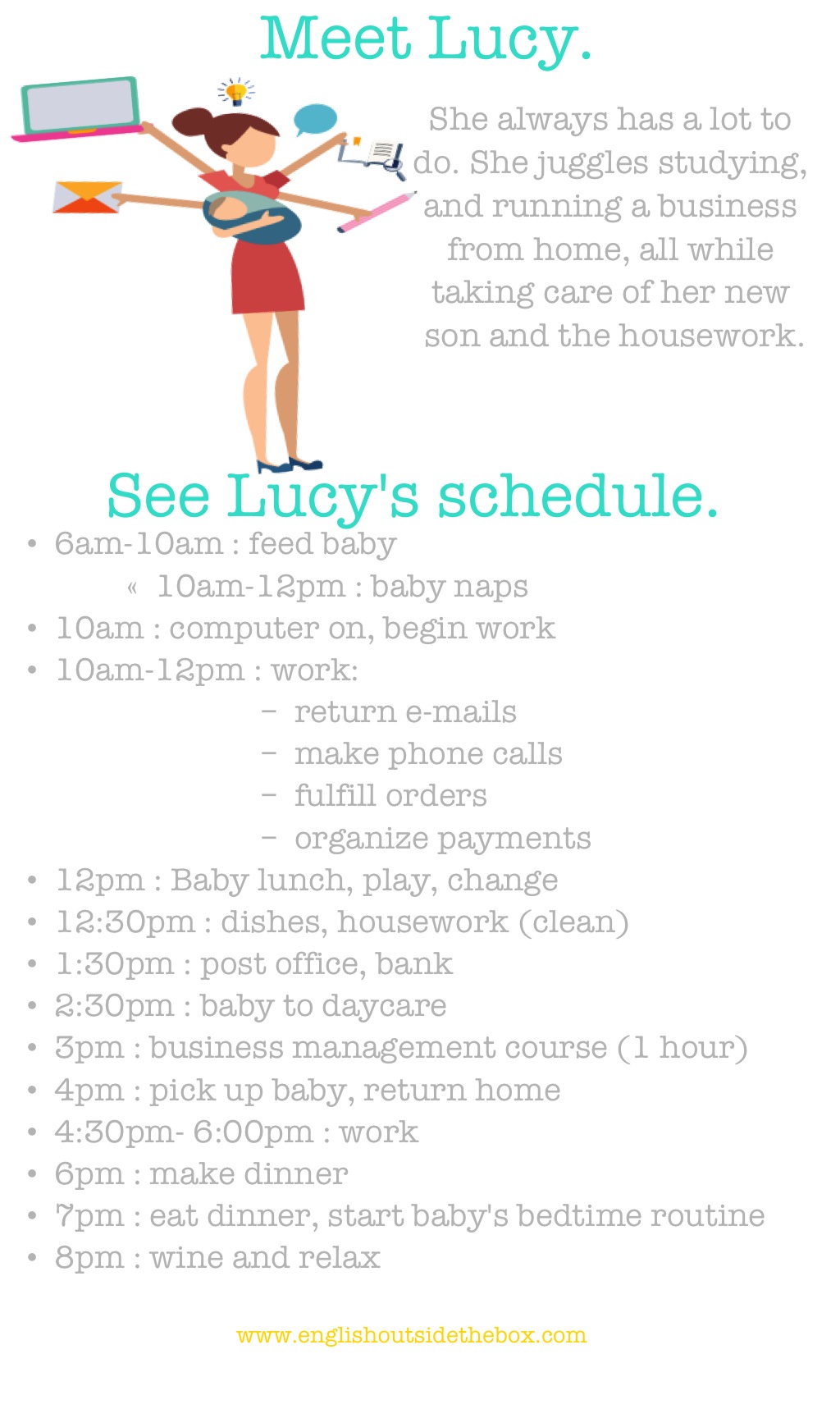
Understanding the Future Tense (+ practice)
Think about the amount of times you speak in the future tense: talking about personal plans, work goals, vacations, schedules, predictions, etc… Learning and understanding the various ways you can communicate in the future will help you be more successful in expressing yourself. Remember, even though all of the following tenses are “the future,” each have a different emphasis, or focus. Being able to accurately understand these, will help you move from an English learner, to an English speaker.
Let’s begin with reviewing all of the tenses you can use to express the future time.
- Simple Present
- Present Continuous/Progressive
- Simple Future: Will and Be going to
- Future Continuous/Progressive
- Future Perfect
- Future Perfect Progressive
 Notice the small differences between them in the picture above. Notice their structure and form in the sentence examples.
Notice the small differences between them in the picture above. Notice their structure and form in the sentence examples.
Do you understand what you read? Please ask questions in the comment section if you are still confused, or would like more explanations.
Let’s practice with some “real life” context. We will use Lucy, and her everyday schedule to make some sentences and practice the future tense. Later, in the comment section, you can create your own sentences to continue practicing the different future tenses.
Simple present:
* Tomorrow, she starts work at 10 am. (it’s a scheduled action (could be a timetable), also something she does everyday.)
Present Continuous:
* She is taking a course in business management this month. (she’s doing it now, and it continues into the extended present, in an unfinished time period: this month.)
* Tomorrow, she is picking up the baby from daycare at 4pm. (it’s a schedule action, with a time expression (tomorrow) and in the near future.)
Simple Future:
*She is going to feed the baby at 10am. (it’s something that’s planned, and she has thought about it…hey, the baby needs to eat!)
* Maybe the baby will take a nap before 10am. (this is a prediction, with no evidence. Normally, the baby sleeps at 10, so it’s a guess with no reason that they baby will sleep before.)
Future Continuous:
* She will be working tomorrow from 10am to 12pm and the baby will be taking a nap. (two paralleled actions happening in progress, at the same time in the future.)
* Tomorrow at 6:30pm, she will be making dinner. (this is something that will already be in progress at 6:30pm, because she starts cooking at 6pm.)
Future Perfect:
*By 8pm tomorrow, the baby will have already been put to bed. (you use the expression: “put the baby to bed” when you put them into the bed to sleep. Because she will have wine at 8pm, the action of putting the baby to bed will have already been finished.)
*By 7pm, Lucy will have finished making dinner. (Because she is eating at 7pm, the action of making dinner will already be finished).
Future Perfect Continuous:
* She will have been working for 2 hours by the time she eats lunch. (2 hours of work will have already been in progress before lunch, because she works from 10am-12pm.)
* By 6:45pm, Lucy will have been making dinner for 45 minutes. (we know that 45minutes of cooking will have already been finished, and in progress at 6:45pm because she started cooking at 6pm.)
Now, can you make your own future tenses about Lucy and her busy schedule. You can practice by explaining what her day will be tomorrow.
GOOD LUCK! and HAPPY STUDYING! ♥
The Conversation Club will provide you with 6 group conversation calls to practice with a real teacher and a group message community to connect with other members.
You will also get weekly English lessons to help your vocabulary, listening, reading, pronunciation, and more!
Try the Club for 1 week, free! Join the 1-week free trial here.


[…] Understanding the Future Tense (+ practice) […]
[…] can review the future tense here, the past perfect here, and review some of the differences between the simple past and present […]
[…] on English Outside the Box have been vocabulary (words of the weekend) and grammar, specifically the future tense. However, knowing what to say, is just as important as knowing HOW to say it. Speaking with […]
It was greatly helpful! It helped me understand the difference between ‘will’ and ‘be going to’ in future prediction. I have read several grammar books but the explanations didn’t sit very well with me.
Now I grasped the difference – with or without evidence! Thank you!!
No Problem Noririn! Glad to help 🙂
i am little confused Jennifer the way you used different tenses for daily routine, As in my school teacher taught me daily routine should be in simple present always.
Hi Garima! For routines, yes…the simple present is used. This is why for future events with timetables (buses, trains, etc..) we use the simple present, because it’s a routine! However, you cannot ALWAYS use the simple present, so that is where you can practice with my examples.
Jennifer i love way you teaching tenses
Very helpful! Verb tenses can be SO confusing!
Yes they can be! Glad it’s helpful!